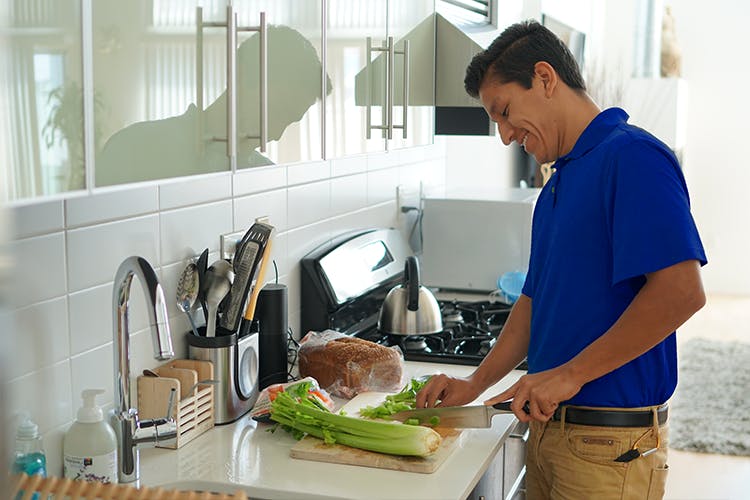How Caregivers Help Seniors with Cardiovascular Disease Eat Healthily

Many senior citizens neglect their dietary needs. However, seniors—the age group at highest risk of cardiovascular disease—should actually be even more focused on healthy eating. And yet the easiest dining choices for seniors, including meal delivery, takeout, and prepackaged meals, are often loaded with sodium and trans fats that can harm a senior’s cardiovascular health.

Conversely, healthy dieting depends on tasks that can be challenging for seniors, such as planning recipes, making frequent shopping trips to buy fresh produce, and prepping and cooking meals at home. Many seniors may need the assistance of an in-home caregiver, a trained professional to provide seniors with care and company as well as help with important tasks at home including meal prepping. Did you know that many senior caregivers are trained to provide their clients with meal plans specific to their health needs? Read on to learn how caregivers can assist those with cardiovascular disease follow a healthy, nutritious diet.
Heart–Healthy Diet Tips
Heart health experts recommend that those who suffer from cardiovascular disease alter their diet accordingly. The best diet for those with cardiovascular disease centers on fresh fruits, vegetables, low-fat proteins such as fish, and whole grains, and limiting certain heart-unhealthy foods. Seniors with sensitive heart conditions should avoid meals high in sodium, fats, oils, and high-calorie/low-nutrient foods such as fast food. Many experts recommend that you plate your food with half fresh produce and half other healthy foods, such as brown rice and turkey.
But what you eat isn’t always as important as how much you eat. Controlling calories is also essential to improving one’s cardiovascular health. A senior caregiver can help prepare appropriate portion sizes for seniors to keep them healthy, taking care to refer to their doctor’s recommendations. There’s a strong relationship between cardiovascular disease and diet and exercise, so a caregiver can help your senior loved one be as active as possible—following doctor recommendations—and can help monitor their diet.
The Importance of Personal Preferences
In-home caregivers can also incorporate your senior loved one’s personal dietary preferences and tastes into their meal prepping decisions. This doesn’t just keep your loved one happy, but it also helps them adjust to eating a heart-healthy diet without making excessive sacrifices. Many caregivers know that heart health isn’t about being perfect; a perfect diet of raw produce and little seasoning would be highly unsatisfying for any senior citizen. Sometimes, eating healthy just means eating a little bit healthier, and caregivers can help guide your loved one in that direction.
After all, experts agree that the easiest diet to implement is one that you enjoy. Extremely limited and unenjoyable diets are simply more difficult to follow. When caregivers incorporate a senior’s personal preferences into their meal prepping choices, everyone knows what to expect and both your loved one and their caregiver can feel more relaxed about preparing heart-healthy foods.
Underlying Issues
There are some underlying issues that may cause eating problems for seniors with cardiovascular disease as well as those at high risk for heart problems. Trouble with transportation can limit access to grocery stores. Eating a heart-healthy diet means relying on highly perishable fresh produce, and that means making frequent trips to the grocery store. Seniors with mobility issues may also have trouble standing in their kitchen for long periods of time to prepare fresh meals. Seniors with difficulty cooking for themselves won’t always make heart-healthy meal choices. Thankfully, senior caregivers can assist with these tasks.
Then there are other health challenges, such as obesity, that can make it difficult for your senior loved one to maintain a healthy diet. A caregiver should be present to help your loved one make good choices for their heart health. They may recommend eliminating junk food from their pantry or avoiding taking meals in front of the television, a habit that often leads to distracted eating and higher calorie consumption. One of the most valuable benefits of hiring a caregiver is regular, careful meal preparation.
Dedicated Senior Care
Your senior loved one deserves dedicated care from a trained and experienced caretaker who can assist with meal preparation, serving and cleaning up after your loved one, and closely following physician recommendations. 24 Hour Home Care employs the best caretakers who can be available around the clock to assist the senior in your life with all manner of daily tasks. Whether they need assistance with mobility, taking medications, meal preparation, or just attentive care and company, 24 Hour Home Care can provide the compassionate in-home assistance that your loved one deserves. We conduct thorough background checks on all of our caregivers because we know that opening up your loved one’s home is a sensitive issue. If you feel that your loved one may need close and careful assistance in the comfort of their home, call us at (800) 522-1516 to find reliable, trustworthy help.
